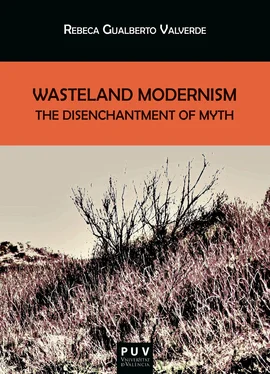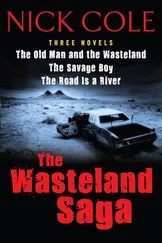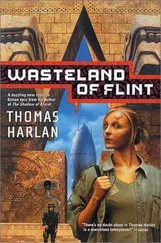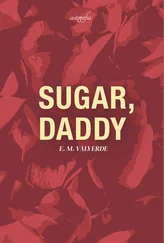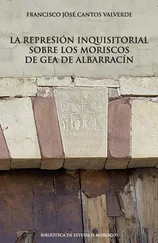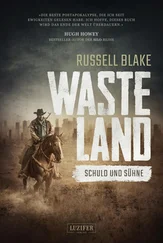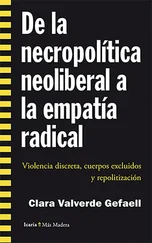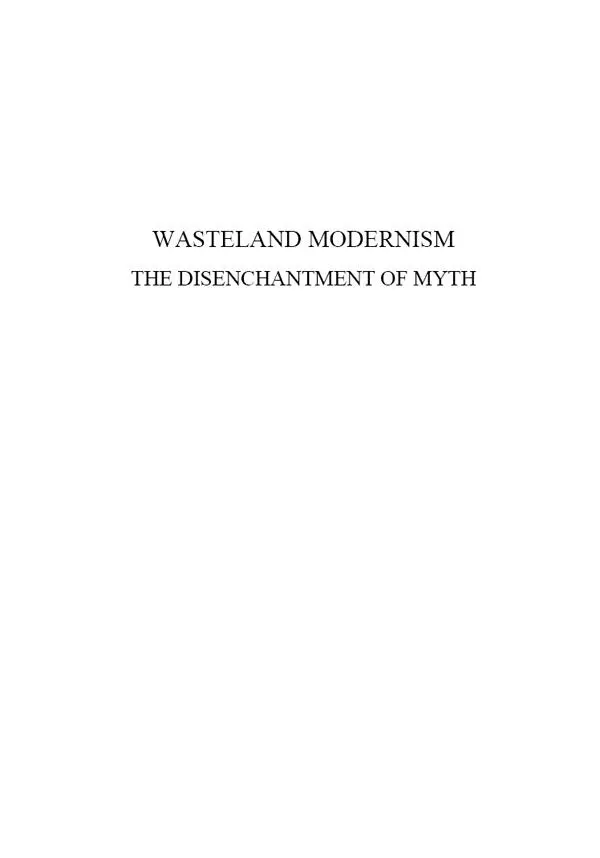
BIBLIOTECA JAVIER COY D’ESTUDIS NORD-AMERICANS
http://puv.uv.es/biblioteca-javier-coy-destudis-nord-americans.html
http://bibliotecajaviercoy.com
DIRECTORA
Carme Manuel
(Universitat de València)
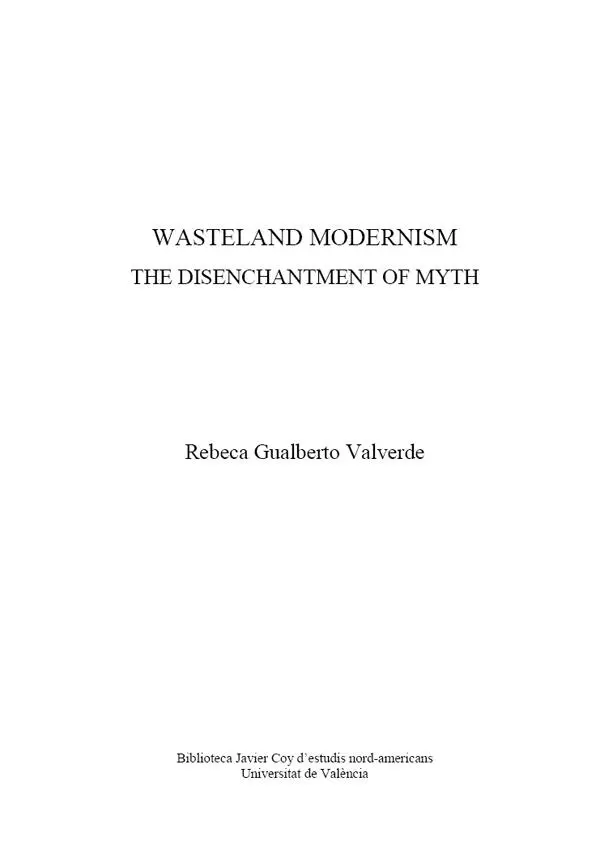
Wasteland Modernism: The Disenchantment of Myth
© Rebeca Gualberto Valverde
1ª edición de 2021
Reservados todos los derechos
Prohibida su reproducción total o parcial
ISBN: 978-84-9134-844-3
ISBN: 978-84-9134-845-0 (ePub)
ISBN: 978-84-9134-846-7 (PDF)
Ilustración de cubierta: Sophia de Vera Höltz
Diseño de la cubierta: Celso Hernández de la Figuera
Publicacions de la Universitat de València
http://puv.uv.es publicacions@uv.es
Edición digital
Para Juan.
And we mean to go on and on and on and on .
Acknowledgements
I cannot express enough gratitude to my friend and mentor Dr. Eduardo Valls Oyarzun for his unwavering support and encouragement since he prompted me to begin this line of research fifteen years ago. I can certify that this book would have never been published without his invaluable assistance, his superlative knowledge, and his unending patience. I would also like to express my sincere thankfulness and deep affection to Dr. Isabel Durán Giménez-Rico, who supervised this project in the early stages and has always offered me her irreplaceable help and continued support. Thank you always for the endless learning opportunities.
The completion of this project could not have been accomplished without the help and friendship of my colleagues Dr. Carmen Méndez and Dr. Laura de la Parra, whose outstanding talent and untiring work ethic always drive me to try harder. I admire them greatly. Thank you also to Dr. José Manuel Losada Goya, for driving forward the studies of myth at Complutense University of Madrid and for giving me the chance to participate in many research activities, projects and exchanges that have undoubtedly enriched my work over the years.
Finally, thank you always to my friends and family. Thank you for your presence and your enthusiasm. My deepest gratitude goes to my parents, whose constant support and belief in me has enabled my accomplishments. And, of course, infinite thanks to Juan and to my children. They are a constant source of joy, comfort and pride. This book is all for them.
Contents
Introduction
CHAPTER 1 “Shall I at least set my lands in order?”: Post-war Mythopoeia in T. S. Eliot’s The Waste Land
CHAPTER 2 “If I could git more into the center of things…”: The End of Life in John Dos Passos’s Manhattan Transfer
CHAPTER 3 “For a transitory enchanted moment”: The Disillusion of Romance in Francis Scott Fitzgerald’s The Great Gatsby
CHAPTER 4 “A Spectacle with unexplained horrors”: Disenchanted Ritual in Ernest Hemingway’s The Sun Also Rises
CHAPTER 5 “The cycle is too cruel”: The Ambivalence of Myth in John Steinbeck’s To a God Unknown
CHAPTER 6 “Godamercy, they have shot the Holy Grail!”: Mythical Wreckage in Djuna Barnes’s Nightwood
Conclusion
Works Cited
Introduction
In The Persistence of Modernism Madelyn Detloff describes modernism as “a constellation of discourses about wide-spread loss and violence” (4). The assessment goes further than traditional definitions of the period, such as Friedman’s well-known claim that modernism responds to the crisis of belief that afflicts western civilization at the beginning of the twentieth century, defined by “loss of faith, experience of fragmentation and disintegration, and the shattering of cultural symbols and norms” (97). Detloff’s definition focuses on the violence in a mode of representation that changed course after the “bloody cataclysm” (Levenson Modernism 221) of the First World War, “a provocation, a trauma, and a stimulus” (220) that shocked the world-picture of modernity and propelled the creation of new forms (227). World War I was a massive catastrophe; it stood as “a watershed between Enlightenment ideals, like the constant progress technology promised, and their gruesome disillusionment—in the mass grave into which technological war converted the earth of Europe” (Sherry 18). Modernism, after the war, attempts the creation of art from a place of wreckage. It takes place in a mass grave. Enlightenment ideals were lost to the carnage on the battlefield; old cultural symbols and norms are no longer valid to negotiate the horror of contemporary existence. In this context, modernist literature, weary and disillusioned, turns to traditional myth.
In his fundamental study on myth and modernist literature, Michael Bell claims that “mythopoeia is the underlying metaphysic of much modernist literature” (2). His main claim is that, at the turn of cultural modernity, 1 individuals had to endure “the double consciousness of living a world view as a world view” (1), that is, an awareness that their own beliefs and understandings were not transcendentally grounded and could not be privileged over the beliefs and understandings of others (1). Myth, once “foundational, holistic and inarguable” (12), was revealed as objectively not true. Thus, because of its “simultaneous reference to belief and to falsehood” (3), mythopoeia became a useful vehicle to encapsulate the paradox of the modern world view. Traditional myth, a lost cultural symbol, was now understood as merely a way of seeing the world. As is the claim of the present study, American modernism uses myth precisely as such.
At the beginning of the twentieth century, art focused on recording the emotional impact of the war crisis. It tried out new ways to express the “despair, hopelessness, paralysis, angst, and a sense of meaninglessness,” which resulted in a cohort of literary scenarios dominated by the “various waste lands in modernist literature” (Friedman 97). This book aims to explore those various waste lands through a rigorous myth-critical interpretation of six very well-known works of American modernism, analyzing a coherent process of mythical representation and revision that might help decode an “active search for meaning” (Friedman 97) traceable in the selected corpus. As Friedman wrote, “the search for order and pattern began in its own negation, in the overwhelming sense of disorder and fragmentation caused by the modern materialist world” (97). As this study will argue, American modernist writers locate primitive myth precisely in that interplay of order and chaos, of pattern and disarray. Myth is undone and redone, shattered in the process of literary representation as it is a cultural icon of a fallen world.
Looking at the many wastelands of modernism from a myth-critical perspective, then, this investigation seeks to probe the modernist reinterpretation of the Arthurian myth of the Waste Land. 2 Even though well established by the critical tradition that has explored American literature in the twentieth century, 3 the topic requires a fresh, in-depth reconsideration. Using the tools of contemporary mythcriticism may provide some clarity for elucidating the meanings constructed, challenged, or reinforced in the specific mythopoetic mechanisms of American modernism. Primitive myth—the pervasiveness of which in modernism might initially be intuited as a reaction against the defeated rationalism of Enlightenment for how it accompanies “the collapse of the whole idealist tradition” (Bell 20)—is in fact an extraordinarily expressive instrument to represent the conditions of modernity.
Читать дальше
